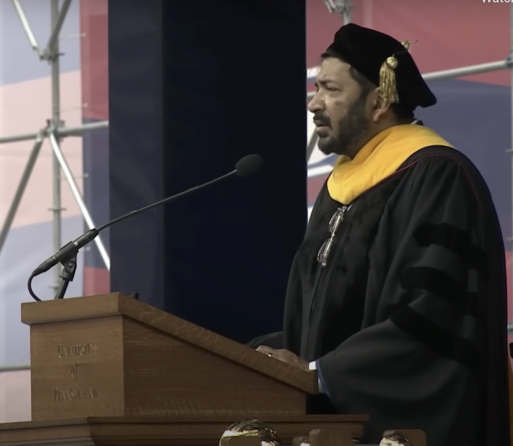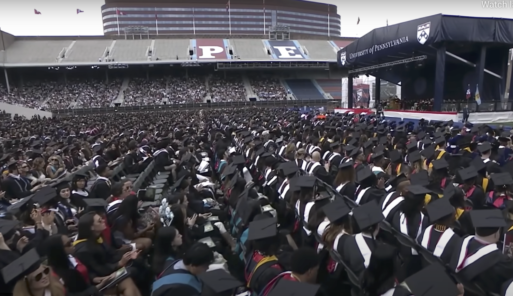
Dr. Siddhartha Mukherjee addresses the graduating class at the University of Pennsylvania, May 2024.
As an oncologist, Dr. Siddhartha Mukherjee has spent years watching terminal patients interact with loved ones in their final hours. He observed that a person’s last words were often variations of four offerings that revealed their greatest desires and regrets.
The four offerings were:
- I want to tell you that I love you.
- I want to tell you that I forgive you.
- Would you tell me that you love me?
- Would you give me your forgiveness?
Mukherjee, a Pulitzer Prize-winning author, presented his observations in a May commencement speech at the University of Pennsylvania. Aware that his end-of-life topic might have seemed out of place to his audience, he began by assuring them that “This is not a morbid talk but an uplifting one.”
Implied in his observations, was the recognition that many of his patients suffered by waiting until their final transition to express their need to give and receive love and forgiveness.
The graduates, he pointed out, were also in a transition, a birth and a death. And as they made this transition into the next phase of their lives, he wanted them to be thinking about “the four offerings,” and utter those phrases to the people they cared about at some point on graduation day.

Commencement ceremony at the University of Pennsylvania.
“Do it this afternoon, if you wish to do it as you walk out of the stadium … But do it now, at this moment of transition. And here’s the crux. This is the lesson that we can learn from dying. That we can also apply to life and to living. Waiting merely delays the inevitable. Do it. Perhaps when you cross the door, or as you depart for the airport with your overstuffed suitcases, just as you will do it when you await the final crossing, when there’s nothing to carry, and only a lonely boat to help you cross.”
His four offerings bear a marked resemblance to what Dr. Ira Byock expressed in his book, “Four Things That Matter Most,” published 20 years ago and considered a classic work on the topic. A palliative care physician, Dr. Byock distilled his four things down to:
- Please forgive me
- I forgive you
- Thank you
- I love you
Mukherjee’s comments affirm Byock’s original findings that the expression of love and forgiveness are the essential concerns of people facing their final moments, and therefore, should be a primary concern as they live their lives.
Mukherjee closed his commencement address by underscoring that expressing love and forgiveness is vital in today’s world, and is a way of giving back or “returning” the love and forgiveness his audience had received.
“Believe me I can’t ignore the tumult around us. You’re entering a world where love and forgiveness have become meaningless, outdated platitudes like old textbooks. Words people have learned to laugh at. Perhaps you are laughing at them too. But I dare you to use the words meaningfully again. Use them, but not as empty cliches. Imbue them with real meaning. Do it your way, whatever your way is. But do it with the real conviction that you are returning love and returning forgiveness, at this moment of transition and rebirth. And of the horrifying, numbing despair around you, dare to return love and forgiveness to an unforgiving world.”

 The “Four Offerings” People Make As They’re Dying
The “Four Offerings” People Make As They’re Dying


 How Dare You Die Now!
How Dare You Die Now!

 “Help Me, Helen”
“Help Me, Helen”














